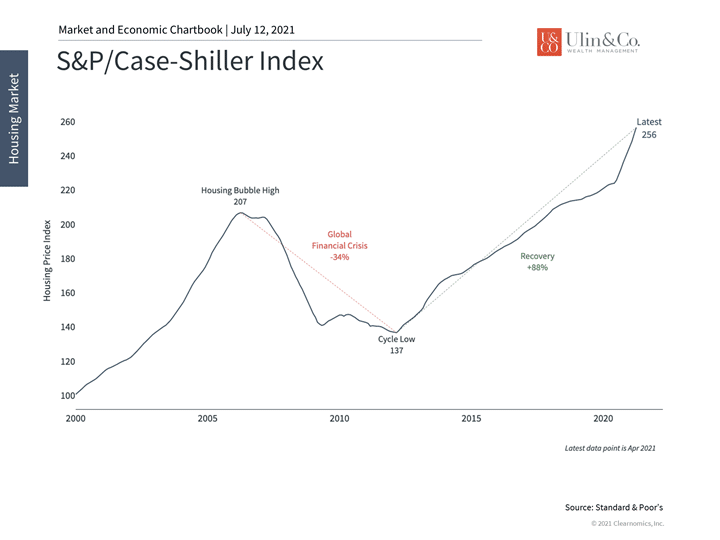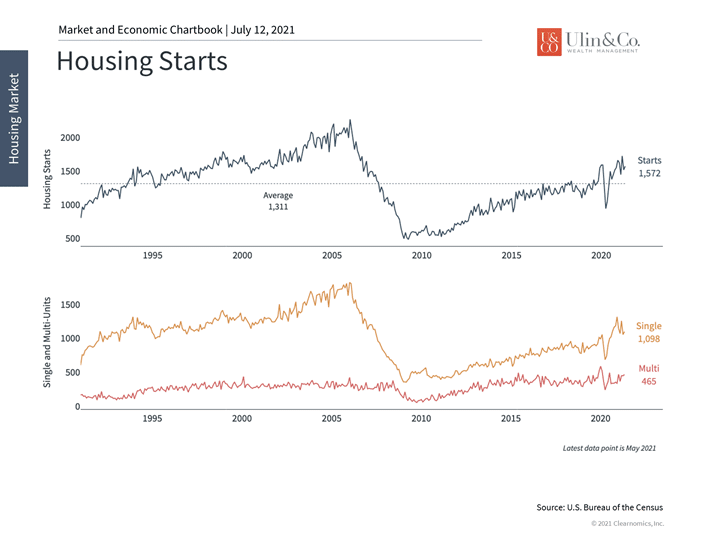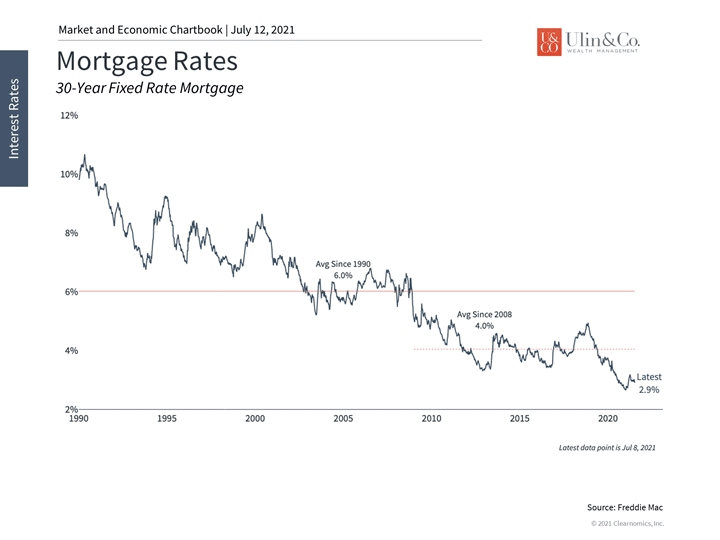Red Hot Real Estate
Housing is a basic human need and has a profound impact on our everyday lives. Our homes are now more of a personal enclosed ecosystem than just an asset or investment. They are serving as our schools, daycare, gyms, pubs, offices and entertainment hubs. Most essentials from food and groceries to other goods are filled or replenished to our front doors with a click of a mouse.
It is well known that many Americans are flocking to the suburbs, moving to warmer climates like South Florida, and trading up their homes over the past year, fueled in part by record low interest rates in addition to “escaping” pandemic issues from apartment living all the while benefiting from remote work as the new normal.
Many of the 72 million millennials are getting older and focused more now on home ownership, while simultaneously more of the 76 million baby boomers are winding down into retirement while downsizing their homes. As a result, home prices have continued to reach new all-time highs that have eclipsed the mid-2000’s housing boom driven in part by a supply and demand imbalance.
Spending considerable time at home, the pandemic has made us hyperconscious of our home environment while taking more trips to the likes of Michaels and furniture stores to Home Depot to help “rethink” and reengineer our unique home environment down to new floor plans, lighting, paint colors, entertainment systems, decor and the creation of our very own backyard oasis.
Sectors Heating Up
Many sectors are getting whipsawed in different directions through the COVID19 recovery since the market bottom March 2020. It is undeniable that people are spending money and on the move. Outlays on durable goods increased at a spectacular 41.4% annual rate for the first quarter on cars, jewelry, appliances, home furniture and other substantial goods helping to fire up inflation this year.
While it may be remarkable to see record money flowing into real estate during a pandemic that resulted in a market crash, this time truly is different. One of the biggest beneficiaries of the lockdowns, remote work and social distancing measures of the past year has no doubt been the housing market.
The most significant sector headline story and trends on google involve residential real estate prices and whether we are heading into a new housing bubble. While the national appreciation of home values average around 3.5% per year over time, many forecasts predict new-home sales will jump 21% and existing-home sales will climb 9% in 2021.
Contrarian investors antennas are up with 48 million search results on Google this week for “when is the housing market going to crash. Let’s address the elephant in the room. Are we due for a repeat of the 2008 housing bubble? Most likely not.
Today’s real estate boom and housing price surges are not a “house of cards” built on high-risk, adjustable rate, rubber-stamped loans with little cash down that led to a “flipping-frenzy,” magnified by derivatives in the financial markets as we witnessed leading up to the 2008 crash. A recent story in the New York Times noted how homebuyers today are far more financially sound, with 73% of mortgages in the first quarter of this year secured by people with credit scores of 760 or above.
The “Wealth Effect” of Real Estate and Stock Market Ascension
The housing market continues to heat up alongside the post-pandemic boom. The limited supply of homes, historically low interest rates, rising financial asset prices and other factors have created a sense of urgency among many to buy new homes and list their existing ones. As the market further eclipses pre-2008 levels, how does this affect investors?
The housing market is both an income-generating asset class as well as a macro-economic indicator. Housing prices at all-time highs (like the stock market hitting new highs) can bolster financial confidence and spur consumer spending in other areas, a fact often referred to as the “wealth effect.” That this is occurring while all financial assets are rising should not be a surprise, since the housing market is highly correlated with the stock market and other liquid sources of wealth.
The fact that interest rates have fallen in recent weeks may continue to support prices too, whether or not the market needs the support. The 30-year Treasury yield, which peaked at nearly 2.45% in March, is now under 2%. The average 30-year fixed rate mortgage is still below 3% as a result. (see below) While both of these rates are well above their 2020 levels, they are still extremely low by historical standards. The Fed’s guidance that it may keep its policy rate at zero percent until 2023 only supports housing affordability further.
The risk of inflation may also be bolstering the market. As a traditional inflation hedge, real estate investment prices have soared this year. The S&P 500 Real Estate sector has generated a total return of 28%, beating the overall market during the recovery and ongoing rotation in sector leadership. It is currently the second-best performing sector year-to-date behind energy.
Of course, where real estate and related stock prices go from here will depend on several factors including the supply/demand of homes, interest rates, stock market valuations and more. To date, not all assets related to real estate have benefitted equally. Lumber prices for instance, jumped to historic highs earlier this year but have since plummeted. And while the market is still hot in most parts of the country, this could also cool a bit after this initial phase of the recovery.
As always, this is a key reason investors should stay diversified and take a holistic view of their portfolios. The housing market has been a positive sign for the economic recovery and has likely increased the wealth of many on paper. Below are three charts that highlight recent data around this important sector.
1 Housing prices continue to break records

Housing prices in the United States, as measured by broad indices such as the Case-Shiller index, continue to reach new all-time highs. This should be no surprise as financial liquidity searches for income-generating and inflation-protected returns. However, rising home prices can also feed back into financial markets due to the wealth effect.
2 Homebuilding activity is attempting to keep up

With a limited supply of available homes for purchase, housing starts and new building permits have jumped. Over time, supply and demand may reach a better balance.
3 Mortgage rates are still near historic lows

Despite higher interest rates this year, mortgage rates are still near historic lows. This increases the affordability of housing and can motivate buyers to jump into the market. The Fed’s guidance that it will seek to keep rates low until at least 2023 only fuels the market further. Interesting that the average 30-year fixed mortgage rate has been about 6% for the past three decades.
The bottom line? From an investment and economic perspective, the housing market is both itself an investable asset class as well as a macro-economic indicator of financial health. Real estate is running hot due to a variety of factors. While this is a positive sign for the recovery and economic expansion, investors should continue to stay diversified.
For more information on our firm or to get in touch with Jon Ulin, CFP®, please call us at (561) 210-7887 or email jon.ulin@ulinwealth.com.
You cannot invest directly in an index. Past performance is no guarantee of future returns. Diversification does not ensure a profit or guarantee against loss.
The information given herein is taken from sources that IFP Advisors, LLC, dba Independent Financial Partners (IFP), IFP Securities LLC, dba Independent Financial Partners (IFP), and its advisors believe to be reliable, but it is not guaranteed by us as to accuracy or completeness. This is for informational purposes only and in no event should be construed as an offer to sell or solicitation of an offer to buy any securities or products. Please consult your tax and/or legal advisor before implementing any tax and/or legal related strategies mentioned in this publication as IFP does not provide tax and/or legal advice. Opinions expressed are subject to change without notice and do not take into account the particular investment objectives, financial situation, or needs of individual investors. This report may not be reproduced, distributed, or published by any person for any purpose without Ulin & Co. Wealth Management’s or IFP’s express prior written consent.




